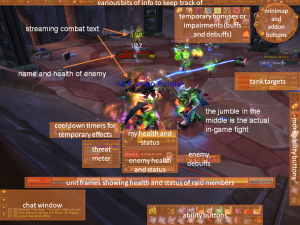Empathy and Agency and Radical Games
Gaming is not a valueless activity. Deep, meaningful relationships develop through gaming, and the cultural life one leads defines their existence as human. To devalue someone’s life is to dehumanize them.
Empathy: Players build meaningful relationships with other players.
Like any other activity with a community around it, gaming is a social and cultural phenomenon. People can bond and form lasting relationships over any affinity. Furthermore, gaming is often about mentorship, hanging out with friends, learning together, and can be about dealing with difference and learning to play off each others’ strengths.
The Pepperdine Gameful Design Lab wants to encourage this community building, to encourage empathy and friendships among all of gaming’s aficionados and hobbyists. By taking gaming seriously but with a playful attitude and tackling what it means to be a gamer collectively means we can live happier more fulfilling lives. We can develop an inclusive community about being good to each other in the shared pursuit of the well-played game.
Agency: Players build meaningful relationships with games.
Games are made up of interconnected systems (rules, mechanics, structures). Players explore and learn how these systems are interrelated through their play, and, in doing so, they become part of the system. A game doesn’t exist except in the enactment.
Players bring with them some sort of imagined future, an ideal state or outcome or maybe even just the hope for some improvement to the current state. Through their activity and “living the system,” players attempt to exercise agency and steer the game’s narrative, all the while themselves being constrained and controlled by the game.
The Gameful Design Lab also wants to encourage resistance towards the inherent control in a game’s rules and structure, to make the narrative emerge from this struggle and transgression. In playing games and designing games, players gain a gaming literacy. They start to understand systems through experience.
Our lives are made up of interrelated systems, of course. From navigating health care to applying to college, from dealing with bullies (online or otherwise) to being a community activist, success often depends on being savvy to our lived systems and understanding them enough to make meaningful decisions. Understanding them well enough to critique them, to resist, and be radical in the face of stupid systems.
Radical Games
If gaming literacy is about deconstructing systems and building meaningful relationships, and our mission is about increasing this literacy, it stands to reason that we need especially to help those who are continually screwed by our life’s systems.
To this end, we propose two main strands of action: 1) develop radical games that encourage transgressive play and empathy building (and moral and ethical reasoning), and 2) host workshops and game jams for those most in need that will encourage the creation of deeply personal radical games.
Like this:
Like Loading...




